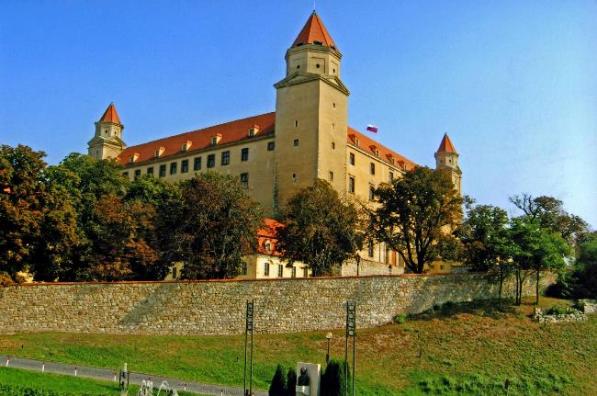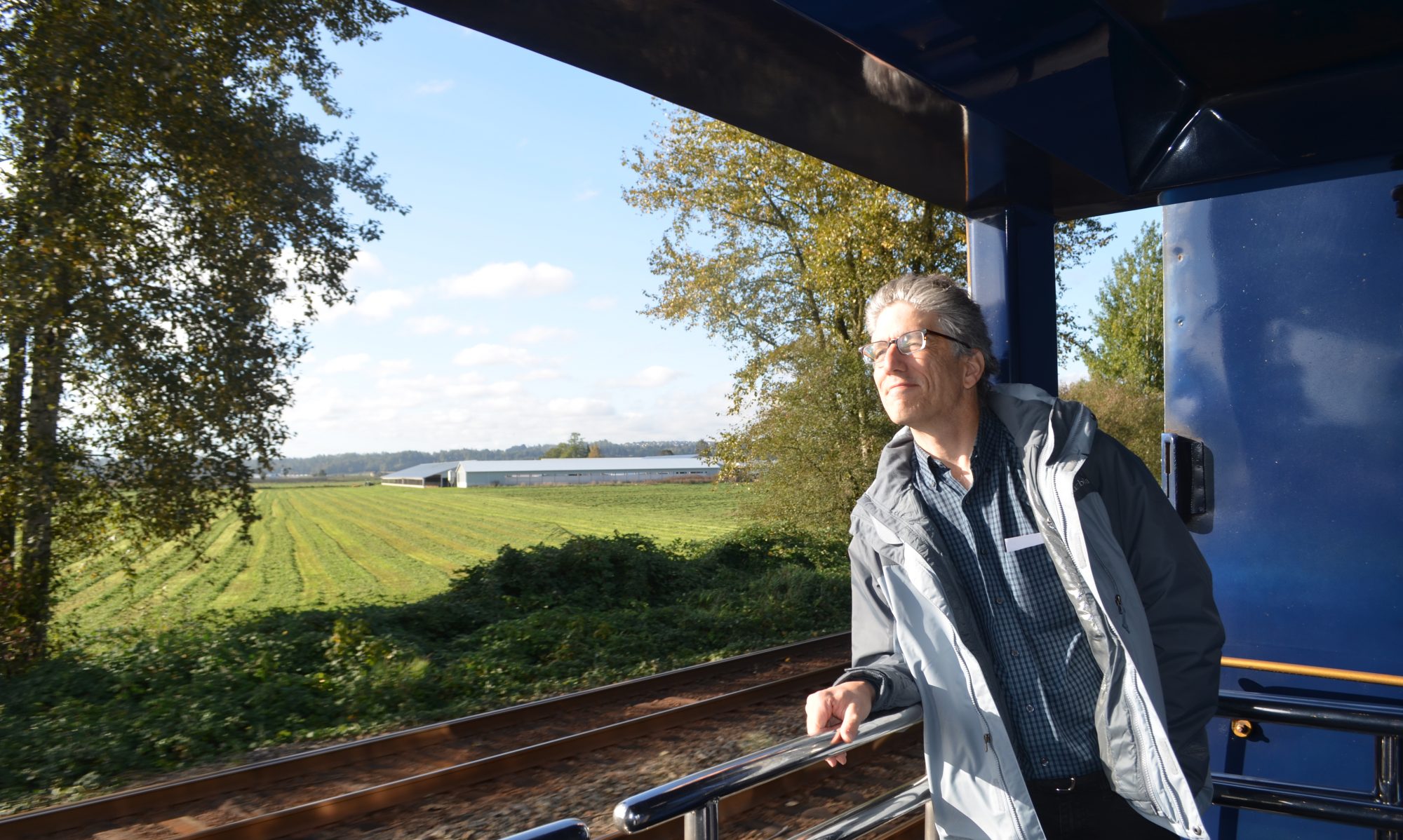Another Day, Another Country

”We’re on the road to nowhere…”
–Talking Heads.
The advantage of Brno being so close to the border is that it’s only two-hours from Bratislava, Slovakia’s capital. Once I arrived I learned that proximity was a dubious advantage. That’s because Slovakia is the former Czechoslovakia’s answer to Tacoma, Washington; Kansas City, Kansas and East St. Louis, Illinois rolled into one.
Just as Kansas City, Kansas is the wretched step sister of Kansas City, Missouri and Tacoma is the poor cousin of Seattle so, too, is Slovakia the Czech Republic’s forgotten relative. The same is true in the comparison between Prague and Bratislava. I don’t know why, but the little I saw of Slovakia was dark and depressing compared to its neighbor. Maybe it’s because, as words go, Czech Republic sounds so much more authoritative than Slovakia (which even now reminds me of a fictional land my father called Lower Slobovia). Perhaps, it could be because the Republic economy seemed much healthier than its neighbor. Then again, it could be because the Republic got better draft picks as well as a few players to be named later.
I’m just not sure.
Regardless, what I saw of Bratislava did not impress. The city may be about the same age as Prague, but it hasn’t weathered the years as well. In fact, if the two cities were people, Slovakia’s capital would be the one that had smoked two packs of cigarettes a day since its teens, toiled in coal mines, or worked with asbestos all of its life while Prague worked in an upper level management job, probably in government, somewhere in the burbs.
I’m not saying Bratislava is any more polluted than Prague, though. It’s just that the city has more of a Soviet flavor. The city’s Old Town is as charming as Prague’s, but it’s smaller and the buildings that surround it weren’t as attractive or as well-kept. As soon as I saw the place, I realized a day would be enough even though my guidebook said it was a good place to spend two or three.
Since Budapest was my next stop, I called a friend from Seattle who was living in Hungary to see if I could hang out with her after I checked into a hostel. She offered me a place to stay, but there was a catch: She was sick and wouldn’t be ready for guests until Monday, four days later. Although I knew Bratislava wouldn’t keep me interested that long, I figured it was worth a day, so I planned to see Old Town and visit Bratislava Castle and Devin Castle overlooking the Danube River.
I wasn’t even looking for the Jewish Museum when I found it. I didn’t even know there was one and would never have seen it if I hadn’t gotten lost on my walk to Bratislava Castle. In truth, it seemed to me to be the Prague Ghost Tour equivalent of a museum: something that seems like a good idea, but doesn’t deliver. Tracing the history of the Jews in the city seemed to be the point of the institution, but it didn’t do a very good job. Plaques posted throughout the museum said the first written record of Jews in the city was in the 1500s or 1600s, but guessed a lot from there. “If Jews were in the city at this time, they certainly would have played a role in…” were the first words on many plaques. The oft-repeated intro made it seem like local Jews were a people in search of a history.
I can almost see the plaques describing a variety of important events that took place in Slovakian history. “If the Jews had been in the city at the time the founding fathers celebrated their victory over the invading Mongol hordes by having a pork roast, they most certainly would not have attended because pig is not kosher.” There could have also been the passage “If the Jews had been in the city on the Saturday Slovakia declared its independence from the Czech Republic, they most certainly wouldn’t have participated because it was their Sabbath and they would have been attending synagogue services.” There could also be the following description of the pogroms (organized, officially sanctioned massacres of minority groups, most often Jews, prevalent throughout Eastern Europe through the centuries): “If Jews were in the city at this time, they certainly would have played a role in the pogroms by being killed or fleeing the city, in which case they would have left no one behind and prompted us to write no more silly sentences like this one.”
Once I left the museum I was disappointed to learn Bratislava Castle was closed. In fact, the only thing open was a museum tracing the development of musical instruments throughout Slovakian history (some of which may have been played by Jews if they were around at the time). When I arrived the only other person in the place was a woman I thought was Chinese, but was actually from Boston. When I told her my next stop was the ruins of Devin Castle, which overlook the Danube, she asked if she could join me. I’m glad she did because we had a great time talking on the bus out to the castle and on the return trip.
It’s also a good thing she came along, because if it hadn’t been for her, I wouldn’t have noticed the camel.
I really don’t know what the camel was doing there, other than standing near the approach to the castle looking out of place. I couldn’t say for sure, but I was pretty certain that camels were not native to Bratislava. To be honest, I couldn’t say the subject of Bratislava had ever come up in conversations with friends — much less Slovakian dromedaries. We were puzzled, but soldiered on until we were rebuffed by guards who said the castle was closed for the next few months due to some sort of movie being filmed there.
Isn’t there some sort of law against this? How can a country shut down a major attraction in the middle of tourist season? More importantly, why would they do it and risk losing out on the tens of dollars tourists spend in Bratislava every year? Considering whatever film company was involved had imported a camel for the job, I figured that it had to be a fairly big production with major bucks. Still, money is no excuse for a city allowing someone to close a major landmark during high season. After all, it’s not unusual for films that are supposed to take place in winter to be filmed in summer (the actors just dress up in cold weather clothes and sweat behind the scenes) and there are even times when movies that are supposed to occur in summer are filmed in winter. Why couldn’t the film crew have done the job later in the year? It wouldn’t have bothered me at all if they had waited a few months. And so, we were turned back as we reached our goal.
Once we returned to Bratislava we had a picnic dinner in the middle of the city and went back to the dorm where we were both staying. We had planned to play cards but we never got around to it because we spent so long talking and comparing notes on Southeast Asia, which was her next stop.
So the day wasn’t a total loss because I spent it with someone nice rather than feeling lonely and bored, even if I didn’t see what I wanted.
It wasn’t enough to keep me in Bratislava, though. I left for Vienna the following day.
